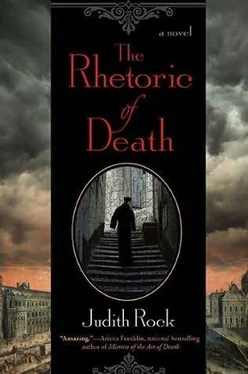Judith Rock - The Rhetoric of Death
Здесь есть возможность читать онлайн «Judith Rock - The Rhetoric of Death» весь текст электронной книги совершенно бесплатно (целиком полную версию без сокращений). В некоторых случаях можно слушать аудио, скачать через торрент в формате fb2 и присутствует краткое содержание. Жанр: Исторический детектив, на английском языке. Описание произведения, (предисловие) а так же отзывы посетителей доступны на портале библиотеки ЛибКат.
- Название:The Rhetoric of Death
- Автор:
- Жанр:
- Год:неизвестен
- ISBN:нет данных
- Рейтинг книги:3 / 5. Голосов: 1
-
Избранное:Добавить в избранное
- Отзывы:
-
Ваша оценка:
- 60
- 1
- 2
- 3
- 4
- 5
The Rhetoric of Death: краткое содержание, описание и аннотация
Предлагаем к чтению аннотацию, описание, краткое содержание или предисловие (зависит от того, что написал сам автор книги «The Rhetoric of Death»). Если вы не нашли необходимую информацию о книге — напишите в комментариях, мы постараемся отыскать её.
The Rhetoric of Death — читать онлайн бесплатно полную книгу (весь текст) целиком
Ниже представлен текст книги, разбитый по страницам. Система сохранения места последней прочитанной страницы, позволяет с удобством читать онлайн бесплатно книгу «The Rhetoric of Death», без необходимости каждый раз заново искать на чём Вы остановились. Поставьте закладку, и сможете в любой момент перейти на страницу, на которой закончили чтение.
Интервал:
Закладка:
Charles walked on. If he was lucky, he was going to need his small store of coins. He lengthened his stride, his cassock flapping smartly around his ankles. But his head swiveled from side to side as he gawked like any newcomer to Paris. The glazed windows everywhere surprised him all over again. Even the windows of the gilded, painted carriages were glass. A half dozen black-robed Benedictine monks cut across his path and he craned his neck to glimpse the turrets of the old Hotel de Cluny, lodging for Benedictine abbots visiting Paris. Nearly colliding with a pair of gowned students debating humanist theology versus the older approaches, he wished he had time to stop and weigh in on the humanist side. But he kept going, dodging a sloshing bucket on a milkmaid’s shoulder pole and a double line of small boys pattering in their teacher’s wake like ducklings, who made him think of Antoine. When he’d stopped by the junior refectory after breakfast to check on Antoine, the boy’s tutor, Maitre Doissin, had come to the door. Using Antoine’s grief and proven ability to leave the college on his own for excuse, Charles had urged Doissin not to leave his charge alone. Without quite asking about the funeral afternoon scene in Antoine’s room, Doissin had said happily that he would watch the boy with all his eyes and added that anything he could do to annoy Guise would be gladly done.
Bells began to ring from every direction. “Be pleased, O Lord, to deliver me; O Lord, make haste to help me,” Charles responded silently, slowing his pace and beginning the prayers for Tierce. Though he wasn’t required to say the offices yet, he loved them and they were already carved years deep into his memory. The words came as easily as breathing and made a satisfying counterpoint to his weaving in and out among the hawkers yelling the virtues of milk, scissors, brooms, drinking water fresh out of the Seine, ribbons, and doubtful summer oysters.
The rue St. Jacques ran straight to the Petit Pont and Charles reached the approach to the bridge as he reached the last psalm’s end: “The Lord shall watch over your going out and your coming in, it is He who shall keep you safe…” Flooded with sudden peace, he bowed his head and let the traffic flow around him.
“Go pray in a church, mon pere, or you’ll be praying over your own corpse!”
Charles jumped aside as a string of mules trotted past, their exasperated driver shaking his head and cracking his whip. Another of the many dangers of religion, Charles thought wryly, and moved into the shade of the ancient bridge’s fortified gate for a quick look at the river. The day was already hot, though a narrow ruffle of pearly clouds lined the horizon. Below him, huge barges mounded with goods floated west-downstream-like mammoth turtles. A few boatmen sent their small craft darting among the behemoths as they ferried passengers across the water. Most boats were loaded with goods, like the small barge piled with casks and guided by a huge sweep tiller just passing under the bridge. A flat-bottomed boat full of unhappily bleating sheep was being tied up at the bank below the quay. Other pedestrians stopped to watch as the gilded and carved prow of a noble’s open boat came in sight, rowed upriver by thirteen pairs of oars and full of richly dressed men and women lounging on cushions, idly watching Paris pass by. Amid all the waterside busyness, an occasional fisherman sat motionless beside his lines. Charles turned to look upriver, where the towers of Notre Dame soared at the end of the Ile de la Cite. Beyond the cathedral, gleaming mansions lined the newish island called St.-Louis. Real estate speculators had made it, Charles had been told, by linking together the little Ile Notre-Dame and another island where people used to pasture cows.
With difficulty, he pulled himself away from the river’s panoply and hurried through the Petit Pont’s massive gate onto the short bridge road. Houses, mostly stone, a few still plaster and timber, crowded close on both sides. A shout of “Gardez l’eau!” sent him to the other side of the roadway as a girl emptied a chamber pot from an upper window.
“Oh, la! Pardon, mon pere!” she shouted, laughing without the least sign of regret.
“You should get a penance for that,” he returned, laughing, too. “Chuck it out the back, mademoiselle, into the river!”
“Come up and give me a penance, then!”
She leaned her round arms on the windowsill and smiled down at him, as people in the street yelled ribald encouragement. Fighting an unclerical grin, Charles kept walking. A shop sign brought him to a halt. The black sign showed a white skeleton Death being ground under a red apothecary’s pestle. Not so long ago, apothecaries had sold sugar. If by some chance this shop still did, he could be done with his errand now, with that much more time for his other business. He ducked through the low doorway and stood blinking in shadow.
“Bonjour, mon pere.”
At first Charles couldn’t locate the treble voice. Then he saw the gleam of eyes peering at him just above the level of the counter.
“Bonjour,” he returned, not sure whether he was addressing a monsieur, a madame, or a child. The eyes vanished and a bulky shape clambered onto a tall stool, settled itself, and became recognizable as a tiny old man. He crossed his short arms and legs, tilted his big head to one side, and waited resignedly for Charles to finish realizing that he was a dwarf.
“Now that we’ve got that over,” he said briskly, “what can I do for you, my fine young cleric?”
“I wondered if, by chance, you have sugar, monsieur. Very white sugar.”
“If your grandfather had come in asking that, or your father, even, the answer would have been yes. But we don’t sell sugar now, you should know that.” The little man shrugged. “Though I hear your accent and maybe apothecaries still sell it in the south, people are backward down there. But sugar’s too common here for Parisians to think it cures anything. And it tastes too good. They could excuse that when it was rare as unicorn’s horn and nearly as expensive. But common as mud and lovely to eat, who spends silver for medicine like that? Pigeon dung, now, powdered crab’s eye, a little urine from a red-haired boy, some dried mouse liver, those are worth money and they’ll cure you, sure as saints have halos! Why? Because they’re disgusting. And who ever gets well without suffering?”
“Will they cure you?”
“People think they will and that’s probably just as good. Nothing much cures anything, young man. Oh, oh, yes, prayer, of course. We mustn’t forget prayer, must we?” His sarcasm was acid enough to strip the varnish from his counter.
“It sounds as though you don’t believe that cures much, either,” Charles said.
“One thing cures every ill.”
“What’s that?”
“Death.”
But the dwarf didn’t laugh and his eyes were as somber as a funeral Mass. He looked Charles over, enviously but without malice.
“Death will come even to beautiful young men like you eventually, I don’t need to sell you that.” He jerked his head to the north. “Sugar is across the bridge, at the Marche Neuf.”
Thanking him, Charles escaped. As he emerged into the street, a woman brushed past him toward the shop. Her gown and head scarf were unrelieved black, but a surprising froth of rose-colored petticoat swirled under her skirt as she stepped over the apothecary’s high threshold. Charles heard the dwarf’s voice rise warmly in welcome.
Charles turned away quickly. He didn’t need anything more to tell his confessor. He covered the short distance to the Ile de la Cite, turned right onto rue Neuve Notre Dame, realized when he ended up in front of the cathedral that he should have turned left, and retraced his steps. The Ile was the oldest part of Paris, settled even before the Romans came, and the so-called Marche Neuf, the New Market, was old, too, though not that old. This morning it was happy and lucrative chaos, as sellers called their wares, buyers bargained, and sweating jugglers and tumblers vied for whatever coins they could wring from the crowd-deniers, even a few sous if they were lucky, or nearly worthless old copper liards if they weren’t. Dogs barked, chickens squawked, and the barefoot children who weren’t gathered in front of a marionette show chased each other among the market stalls. The savory smell of roasted meat set Charles’s stomach rumbling. Then the deep strong scent of coffee caught him by the nose. He’d tasted coffee and liked it. The Dutch, of course, were mad about it, and had more or less cornered what market there was for it. Paris had coffeehouses, but Charles suspected it was just one more passing craze.
Читать дальшеИнтервал:
Закладка:
Похожие книги на «The Rhetoric of Death»
Представляем Вашему вниманию похожие книги на «The Rhetoric of Death» списком для выбора. Мы отобрали схожую по названию и смыслу литературу в надежде предоставить читателям больше вариантов отыскать новые, интересные, ещё непрочитанные произведения.
Обсуждение, отзывы о книге «The Rhetoric of Death» и просто собственные мнения читателей. Оставьте ваши комментарии, напишите, что Вы думаете о произведении, его смысле или главных героях. Укажите что конкретно понравилось, а что нет, и почему Вы так считаете.












